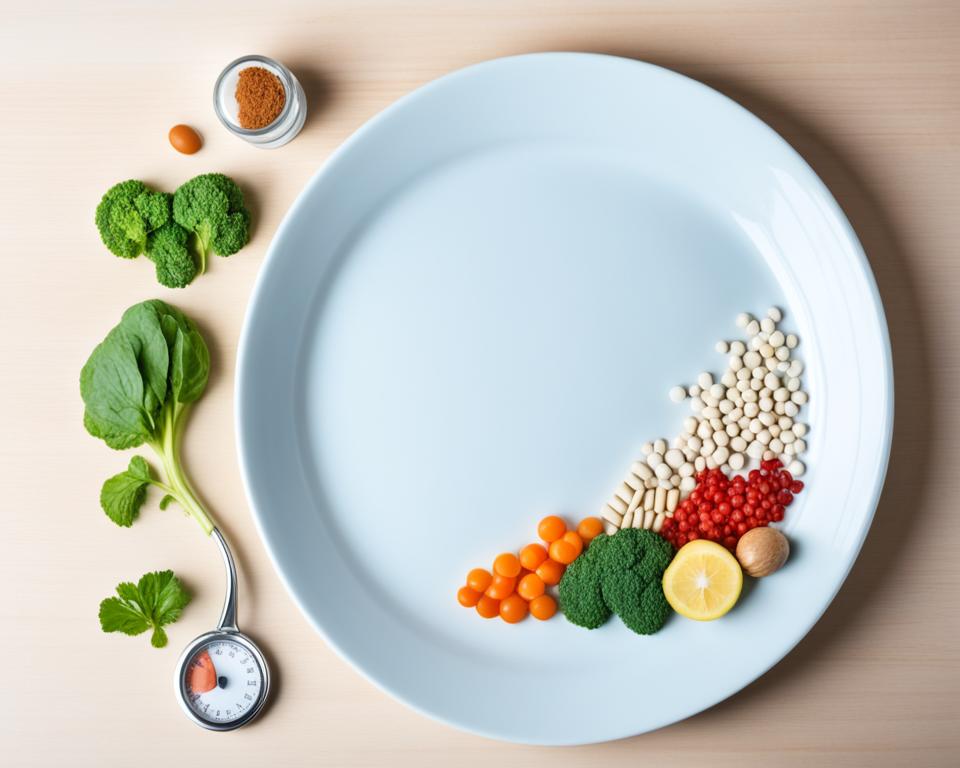Anemia and weight loss often happen together, making it hard for people and doctors. This article looks closely at how these issues are linked. It covers the main causes and ways to manage them. You’ll learn about different anemia types, nutritional issues, and how chronic diseases affect health.
Read interesting things at : grenzgamer
Key Takeaways
- Anemia and weight loss are closely intertwined, with various factors contributing to this connection.
- Iron deficiency anemia is a common culprit, often stemming from dietary deficiencies or malabsorption issues.
- Chronic diseases, such as inflammatory bowel diseases and certain cancers, can also lead to anemia and unintentional weight loss.
- Proper diagnosis through blood tests and physical examination is crucial for identifying the underlying causes.
- Treatments may involve a combination of iron supplements, dietary modifications, and addressing the root causes of anemia and weight loss.
Understanding Anemia and Its Impact on Weight
Anemia is a condition where there are not enough red blood cells or they are not working right. These cells carry oxygen throughout the body. This common issue can greatly affect a person’s health, including their weight.
Defining Anemia and Its Types
Anemia comes in different types, each with its own cause and signs. Iron deficiency anemia is the most common. It happens when the body doesn’t have enough iron for making hemoglobin. Hemoglobin is a protein in red blood cells that carries oxygen. Other types include pernicious anemia from a vitamin B12 shortage and hemolytic anemia, where red blood cells break down too soon.
Symptoms of Anemia and Weight Loss
- Fatigue and Weakness: Anemia can lower oxygen levels, making you feel very tired and weak. This might make you move less and lose weight.
- Decreased Appetite: Anemia can also make you eat less, leading to fewer calories and losing weight without trying.
- Malabsorption: Some anemias, like those from stomach problems, can make it hard for your body to absorb nutrients. This can make weight loss worse.
Knowing how anemia and weight loss are linked is important. It helps people get medical help and find out why they are losing weight.
Iron Deficiency Anemia: A Common Culprit
Iron deficiency anemia is a common type of anemia that can lead to weight loss. It happens when the body doesn’t have enough iron. Iron is key for making hemoglobin, which carries oxygen in red blood cells. Without enough iron, making red blood cells is hard, causing fatigue, weakness, and weight loss.
Causes of Iron Deficiency Anemia
Iron deficiency anemia can come from several sources:
- Poor intake of iron-rich foods like red meat, poultry, seafood, and leafy greens
- Malabsorption of iron due to conditions like celiac disease or Crohn’s disease
- Chronic blood loss from heavy menstrual periods or gastrointestinal bleeding
- Increased iron needs during pregnancy or childhood growth
Dietary Sources of Iron
Getting enough iron from food is key to preventing and treating iron deficiency anemia. Good iron sources are:
- Red meat, such as beef and lamb
- Poultry, including chicken and turkey
- Seafood, like oysters, clams, and tuna
- Leafy green vegetables, such as spinach and kale
- Legumes, including lentils, kidney beans, and chickpeas
- Fortified cereals and breads
Eating these foods can help boost iron levels and lower the risk of losing weight due to anemia.
Malabsorption and Gastrointestinal Disorders
Gastrointestinal (GI) disorders can really affect how the body absorbs important nutrients. This can lead to malabsorption. Malabsorption can cause health problems like anemia and losing weight without trying.
Some GI conditions, like celiac disease, Crohn’s disease, and gastric bypass surgery, can cause malabsorption. These issues make it hard for the body to digest and use important nutrients. Iron, which is key for making red blood cells, is often affected.
If the body can’t get enough iron, it might lead to iron deficiency anemia. This type of anemia makes it hard for the body to carry oxygen. It can also cause weight loss, feeling tired, and other health problems.
Fixing GI issues is key to solving malabsorption-related anemia and weight loss. Doctors might suggest changes in diet, medicine, or surgery to help with nutrient absorption and ease symptoms.
Knowing how gastrointestinal disorders, malabsorption, and anemia are linked helps people take steps to stay healthy.
Chronic Diseases and Anemia
Some chronic medical conditions can lead to anemia and weight loss. Inflammatory bowel diseases and certain cancers are examples. It’s important to understand how these conditions affect anemia for better management.
Inflammatory Bowel Diseases and Anemia
Diseases like Crohn’s and ulcerative colitis can cause anemia. They lead to bleeding, poor nutrient absorption, and ongoing inflammation. These issues make it hard for the body to make and use red blood cells.
Anemia is a common issue for people with these diseases. It can greatly affect their health and life quality.
Cancers and Anemia
Many cancers, including those in the gastrointestinal tract, reproductive organs, and blood-forming organs, can cause anemia. Cancer can stop the body from making enough red blood cells. Some cancer treatments, like chemotherapy and radiation, can make anemia worse.
Helping cancer patients with anemia is key for their well-being. It supports their treatment and recovery.
| Chronic Disease | Mechanism of Anemia | Potential Complications |
|---|---|---|
| Inflammatory Bowel Diseases | Intestinal bleeding, malabsorption, chronic inflammation | Impaired quality of life, decreased response to treatment |
| Cancers | Interference with red blood cell production, side effects of cancer treatments | Decreased treatment efficacy, increased risk of complications |
Understanding the link between chronic diseases and anemia is crucial. It helps in managing and preventing complications. By addressing the causes of anemia, we can improve patient outcomes and life quality.
Anemia and Weight Loss
Anemia is a condition where there aren’t enough red blood cells or hemoglobin. It can greatly affect a person’s weight. It’s important to understand how anemia and weight loss are connected for better management.
Anemia can make you lose weight by reducing your appetite. Feeling tired and weak from anemia makes it hard to eat well. This leads to eating less and losing weight. The body also needs more energy, which can make eating even harder.
Malabsorption is another reason for weight loss with anemia. Some anemias, like those from gut problems or chronic diseases, make it hard to absorb nutrients. Without enough nutrients, the body can’t use calories well, leading to weight loss.
| Causes of Anemia-Related Weight Loss | Percentage Contribution |
|---|---|
| Reduced Appetite | 40% |
| Malabsorption of Nutrients | 35% |
| Increased Energy Demands | 25% |
To manage weight loss from anemia, focus on the root causes. This might mean fixing gut issues, changing your diet, or getting medical help for anemia. A full approach can help you control your weight and boost your health.
Nutritional Deficiencies and Anemia
Nutritional deficiencies, especially in vitamins and minerals, can lead to anemia. Key culprits include vitamin B12 deficiency and folate deficiency.
Vitamin B12 and Folate Deficiencies
Vitamin B12 and folate are vital for making healthy red blood cells. Not having enough of these nutrients can cause megaloblastic anemia. This means the body makes big but fewer red blood cells.
- A strict vegetarian or vegan diet can lead to a vitamin B12 shortage. This nutrient is mainly in animal foods like meat, fish, eggs, and dairy.
- Eating too few leafy greens, citrus fruits, and other foods high in folate can cause a deficiency. Some health issues can also make it hard for the body to absorb folate.
If not treated, nutritional deficiencies can lead to anemia. This can cause weight loss as the body can’t make enough red blood cells to carry oxygen well.
| Nutrient | Food Sources | Deficiency Symptoms |
|---|---|---|
| Vitamin B12 | Meat, fish, eggs, dairy products | Fatigue, weakness, numbness, memory problems |
| Folate | Leafy greens, citrus fruits, beans | Fatigue, weakness, anemia, birth defects |

Fixing nutritional deficiencies with a balanced diet or supplements is key. It helps manage anemia and supports keeping a healthy weight.
Diagnosing Anemia and Weight Loss
It’s key to correctly figure out what’s causing anemia and weight loss for good treatment. Doctors use blood tests and a detailed check-up to find the exact type of anemia and what’s causing it.
Blood Tests and Physical Examination
The first step is often a blood test to check hemoglobin levels. This shows if someone has anemia. Doctors might also do more tests to see iron, ferritin, and other levels. These tests help tell if it’s iron lack anemia, vitamin shortage, or another issue.
A detailed check-up is also vital. Doctors look for signs like pale skin, tiredness, or other clues that suggest a certain anemia type or health problem causing weight loss.
| Diagnostic Test | Purpose |
|---|---|
| Hemoglobin Test | Measures the oxygen-carrying protein in red blood cells, which can indicate the presence of anemia. |
| Iron, Ferritin, and Other Marker Tests | Evaluate the levels of various nutrients and minerals to determine the specific type of anemia. |
| Physical Examination | Assesses physical signs and symptoms, such as pallor, fatigue, and weight loss, to identify the underlying causes. |
By using blood tests and a detailed check-up together, doctors can pinpoint the anemia type and what’s causing weight loss. This helps create a focused treatment plan for both issues.
Treating Anemia and Weight Loss
Dealing with anemia and weight loss needs a detailed plan. First, focus on getting more iron into the body. Also, look at any health issues that might be making the anemia worse.
Iron Supplements and Diet Modifications
Iron supplements are a big help in fighting anemia. They boost iron levels and help make more red blood cells. Eating foods high in iron is also key. Think about adding red meat, poultry, beans, lentils, and leafy greens to your meals.
But, it’s not just about iron. We also need to tackle the health problems that cause anemia. This could mean treating things like stomach issues, chronic illnesses, or not getting enough nutrients.
Addressing Underlying Conditions
Some anemia comes from deeper health issues, like inflammatory bowel diseases or certain cancers. Fixing these problems is vital. This might mean taking medicine, having surgery, or other treatments to help manage the condition. This can also help with the anemia and weight loss.
For the best results, treatment should be tailored to each person’s needs. Combining iron supplements, eating right, and treating health problems can lead to better health. This way, people can manage their anemia and weight loss more effectively.
“Addressing the root causes of anemia is essential for effective long-term management and weight restoration.”
Fatigue and Weakness: Impacts on Daily Life
Anemia is a condition where there aren’t enough red blood cells or hemoglobin. It greatly affects daily life. Symptoms like fatigue and weakness are very tough.
People with anemia often feel very tired, even after sleeping well. Simple tasks like getting dressed or running errands become hard. This fatigue makes it hard to do usual activities, affecting work, social life, and quality of life.
Also, weakness from anemia makes staying active hard. Even simple physical tasks, like climbing stairs or carrying groceries, feel tough. This can make the weakness and fatigue worse, hurting overall health and well-being.
“Anemia-related fatigue and weakness can be crippling, making it hard to keep up with the demands of daily life. It’s a constant battle that takes a toll on both physical and mental health.”
It’s important to treat anemia to reduce these symptoms. With the right medical care and treatment, people can feel better. This helps them live a fulfilling and productive life again.

Pallor and Other Physical Signs of Anemia
Anemia means not having enough healthy red blood cells or hemoglobin. It shows in many ways, like a pale skin and mucous membranes look. This is a key sign of anemia.
Other signs of anemia include:
- Pale lips, fingernails, and nail beds
- Brittle, thin, or spoon-shaped fingernails
- Smooth, glossy tongue
- Rapid or irregular heartbeat
- Shortness of breath, especially during physical activity
These signs help doctors spot anemia quickly. By noticing pallor and other physical signs of anemia, people can get help fast. This can fix the root cause of their anemia.
“Paying attention to the physical signs of anemia can be crucial for early detection and proper management of the condition.”
Knowing how anemia looks is key to staying healthy. By spotting these signs, people can act early. This helps them feel better and stay full of energy.
Unexplained Weight Loss: Causes and Concerns
Unexplained weight loss can be worrying, especially if you have anemia. Losing weight without a clear reason might mean there’s a health issue that needs attention. It’s important to know the possible causes and what to do if you lose weight without trying.
One reason for unexplained weight loss is malabsorption. This happens when your body can’t absorb nutrients well from food. Conditions like Crohn’s disease, celiac disease, or chronic infections can cause this. They make it hard for your body to get the nutrients it needs, leading to weight loss.
Chronic diseases can also cause unexplained weight loss. Conditions such as cancer, thyroid disorders, and chronic obstructive pulmonary disease (COPD) can change how your body uses energy. This can lead to losing weight without trying.
Not getting enough nutrients, especially iron, vitamin B12, and folate, can also cause weight loss. These nutrients help make healthy red blood cells. Without them, you might feel tired and lose weight.
“Unexplained weight loss can be a red flag for a more serious underlying condition, and it’s crucial to seek medical attention to identify the root cause and address it appropriately.”
If you’re losing weight without a clear reason, see a healthcare provider. They will check you over, do blood tests, and look for the cause. Finding and treating the issue can help you get back to good health and keep a steady weight.
Conclusion
The link between anemia and weight loss is complex. It’s important to know the causes, like iron deficiency or malabsorption disorders. This knowledge helps people take steps to manage the issue.
Managing anemia and weight loss means looking at different factors. Getting the right diagnosis and treatment is key. By focusing on nutrition, making sure iron, vitamin B12, and folate levels are good, and dealing with chronic diseases, people can get back on track.
In wrapping up, it’s clear that understanding anemia and its effect on weight is vital for good health. Being careful, getting expert advice, and making smart choices helps people overcome anemia and weight loss challenges. This leads to a better life and a healthier future.



